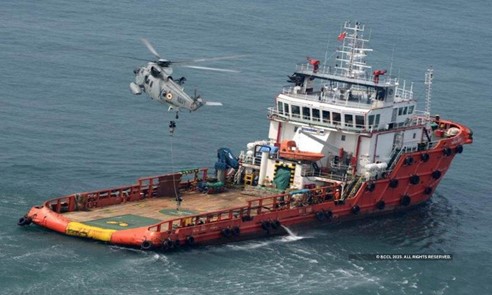
Piracy, a menace rooted in
lawlessness on land, demands a comprehensive and land-based solution as use of
private guards aboard merchant navy ships, while a deterrent to piracy, poses
challenges in piracy-prone volatile oceans as suggested by Bjorn Hojgaard, CEO
of shipping conglomerate Anglo-Eastern Univan Group – one of the largest
employers of Indian seafarers.
Currently, around 2.5 lakh Indian seafarers serve thousands of
specialized cargo vessels across the globe as ratings (semi-skilled workers)
and highly-skilled merchant navy officers. Figures released by
International Maritime Bureau states that in the last 10 months, there’s been
over 10% rise in serious incidents of maritime piracy and armed robbery, and
pirates armed with arms have been able to board around 90% of the targeted
cargo ships unfortunately putting the lives of seafarers on board the vessels
in grave danger.
Hojgaard added “Thus, the
lack of a legal framework, unclear rules of engagement and inconsistent
reporting exacerbate the risks faced by seafarers. Moreover, vessels in piracy
affected waters risk being manipulated for political ends, with crews
unwittingly drawn into conflicts not of their making.
According to Hojgaard, to
address the issue of maritime piracy, a UN-backed international force,
operating under the blue beret operations scheme, emerges as a practical and
ethical solution. “This force, available on a voluntary basis, can provide
vessels with trained and armed UN troops and naval escort, ensuring a legal
framework for liabilities, training, armament, rules of engagement, and
reporting,†he said.
Girish Phadnis, Chairman of
India’s leading shipping association, Maritime Association of
ShipownersShipmanagers and Agents, said, “To
fight maritime piracy, we have petitioned to the Indian Shipping Ministry to
provide an escort of Indian Naval Vessel to every cargo vessels passing through
Red Sea and carries either an Indian cargo and/or has Indian seafarers
on-board, and/or is an Indian flag cargo vessel.â€The Red Sea, which
connects the eastern part of the globe to the western part through the
Aden-Suez Canal corridor, is an extremely busy maritime route which has come
under severe attack recently from Yemen’s Houthi group.
“The economic costs of maritime piracy and geopolitical exploitation far
outweigh the investment needed for preventive measures. Governments across
the globe, maritime industry players, and non-governmental organizations must
collaborate to finance initiatives to fight maritime piracy, placing the burden
on collective shoulders rather than on individual ship owners,†added Hojgaard.